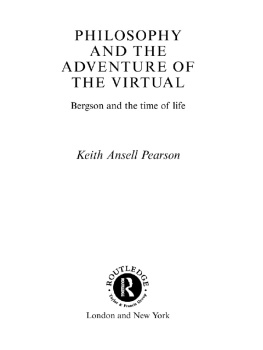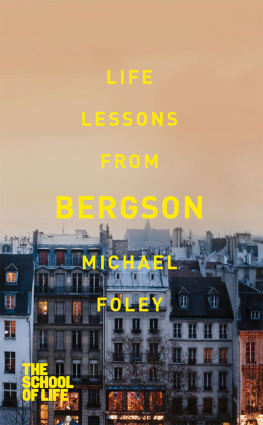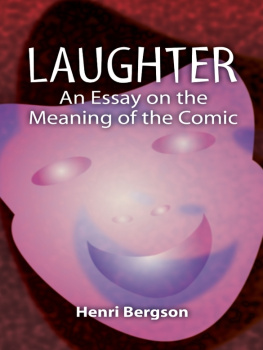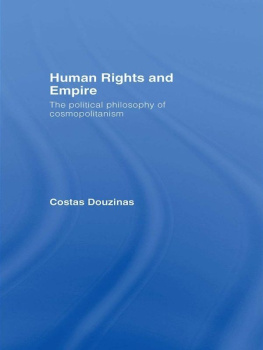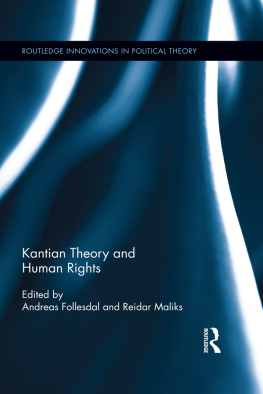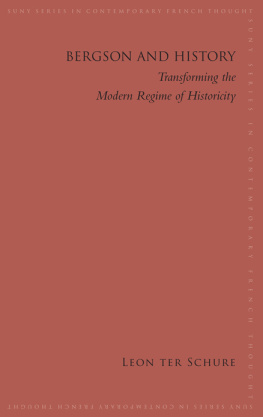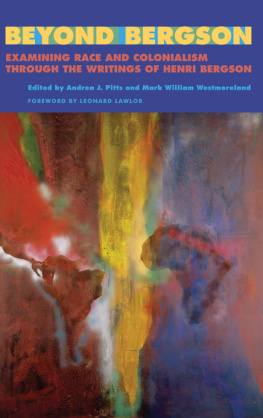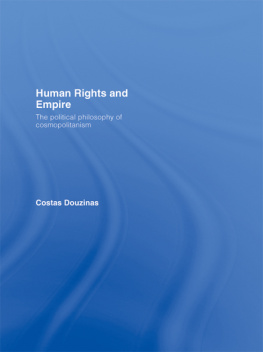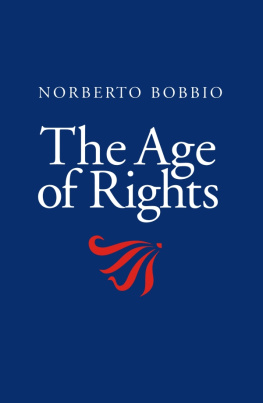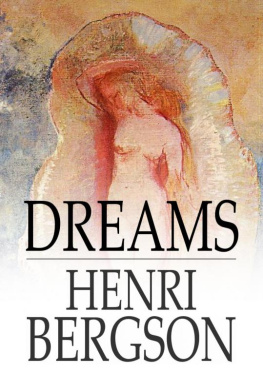Cultural Memory in the Present
Hent de Vries, Editor
HUMAN RIGHTS AS A WAY OF LIFE
On Bergsons Political Philosophy
Alexandre Lefebvre
STANFORD UNIVERSITY PRESS
STANFORD, CALIFORNIA
Stanford University Press
Stanford, California
2013 by the Board of Trustees of the Leland Stanford Junior University.
All rights reserved.
Portions of Alexandre Lefebvre, Bergson and Human Rights, from Bergson, Politics, and Religion, edited by Alexandre Lefebvre and Melanie White, are reprinted by permission of Duke University Press.
No part of this book may be reproduced or transmitted in any form or by any means, electronic or mechanical, including photocopying and recording, or in any information storage or retrieval system without the prior written permission of Stanford University Press.
Printed in the United States of America on acid-free, archival-quality paper
Library of Congress Cataloging-in-Publication Data
Lefebvre, Alexandre, 1979 author.
Human rights as a way of life : on Bergsons political philosophy / Alexandre Lefebvre.
pages cm.(Cultural memory in the present)
Includes bibliographical references and index.
ISBN 978-0-8047-8578-5 (cloth : alk. paper)
ISBN 978-0-8047-8579-2 (pbk. : alk. paper) ISBN 978-0-8047-8645-4 (e-book)
1. Bergson, Henri, 18591941. Deux sources de la morale et de la religion. 2. Bergson, Henri, 18591941Political and social views. 3. Human rightsPhilosophy. 4. Political sciencePhilosophy. I. Title. II. Series: Cultural memory in the present.
B2430. B4D467 2013
323.01DC23
2012045131
Typeset by Bruce Lundquist in 11/13.5 Adobe Garamond
For Melanie,
To whom I can always turn around and ask,
What do you think Bergson means when... ?
Between the closed soul and the open soul there is the soul in process of opening. Between the immobility of a man seated and the motion of the same man running, there is the act of getting up, the attitude he assumes when he rises. In short, between the static and the dynamic there is to be observed, in morality too, a transition stage.
HENRI BERGSON,
The Two Sources of Morality and Religion
Contents
Preface
For me the essential of Bergsonism will always be the idea of philosophy as transformation of perception.
Pierre Hadot, The Present Alone Is Our Happiness
In 1932, nearly a dozen years after the appearance of his previous major work, Henri Bergson published The Two Sources of Morality and Religion. Although he was still regarded as the preeminent French philosopher of his time, the publication of this book caught nearly everyone off guard. One fine day, wrote Jacques Maritain, a close reader of Bergson, without any publicity, without any press release, without anyone, even among the authors closest friends, having been informed, the work that had been anticipated for twenty-five years appeared in bookstores.
The surprise that greeted Two Sources is indicative of its fate. The debate and controversy that surrounded its immediate reception were characterized by misunderstanding and polemic.
Unexpected in its arrival, misunderstood in its reception, and by and large ignored, what interest can this text have for us now? To approach this question, a remark made by Pierre Hadot is helpful. An expert in ancient philosophy, he is by no means a Bergson specialist. But his standing as an appreciative outsider allows him to assess what is timely and vital in this philosophy. When asked in an interview about which aspects of Bergson remain vibrant for him, he replied:
Bergson, for me, was first my baccalaurat paper of 1939, in which I was given the subject from a text by Bergson: Philosophy is not the construction of a system but the resolution, once taken (that is, taken once and for all), to look naively in oneself and around oneself. First, the phrase philosophy is not the construction of a system eliminated all theoretical and abstract construction from the outset. Moreover, the second part of the sentence signified that philosophy is above all a choice and not a discourse. It was a decision, an attitude, comportment, a way of seeing the world.... For me the essential of Bergsonism will always be the idea of philosophy as transformation of perception.
I take it that Hadot is using the word perception in its most expansive sense: that the basic aim of Bergsonism is to transform ones everyday orientation or way of life. Understood in this way, each of Bergsons books can be seen to undertake a transformation of a particular object or region of everyday life. An Essay on the Immediate Data of Consciousness, for example, recovers the immediacy of experience; Matter and Memory regains an attention to the present moment; and Creative Evolution instills an awareness of the creativity all around us. And what would Two Sources do? It presents us with a way of being in the worldBergson calls it loveuntouched by hatred.
I have interpreted Bergsons political philosophy in this vein. To my mind the great power of Two Sources lies in its insistence that, in the end, none of the problems of politicswhich include huge ones such as war and fascism, as well as everyday ones such as prejudice and exclusionwill be resolved without an attendant transformation in the relationship one has to oneself. Its beauty, one might say, is that it is a uniquely non-moralistic text of political philosophy. In refusing to isolateor rather, to insulateproblems of politics from those of ethics, it provides a thoroughgoing reinterpretation not only of the challenges that face us but, most especially, of the demands that solutions to them exact from each one of us.
To bring out this vision of political philosophy I have focused on Bergsons discussion of human rights in Two Sources. The idea behind my book is that he provides a genuinely new way to think about them. Rather than understand human rights as primarily an institution or a mechanism designed to protect all human beings from serious abuse, we will see that Bergson conceives of them as a medium of personal transformation. Or, to borrow terms that will become central to this investigation, my thesis is that for Bergson the main purpose of human rights is to initiate all human beings into love. Thus it is through Bergsons conception of human rights that I propose to channel the problematic of self-transformation that animates the whole of his political philosophy.
I hope this book makes two contributions, one to the philosophy of human rights and the other to the study of Bergson. First of all, I use Bergson to advance a theory of human rights that reinterprets their purpose and function along the lines of self-care. To my knowledge he provides the first and only account of human rights as a medium to improve upon, relate to, and care for ourselves.
This brings me to the second contribution. On the surface it might seem doubtful that Bergson furnishes anything like an account of human rights at all. Certainly he provides suggestive remarks, maybe even a sketch. But an account? Readers familiar with Two Sources will find my concentration on human rights unorthodox. Thats because even by a generous count his explicit discussion of human rights is confined to roughly a dozen pages scattered throughout the whole of Two Sources.dedicated pages Bergson accords them), but, much more than that, they are also the means by which to judge the sense, value, and orientation of all other political forms.
To date, the fact that Bergson has an original concept of human rights remains unknown. This is both surprising and a shame. It is surprising because on a personal and practical level Bergson was deeply committed to the realization of human rights. For example, he worked closely with the Woodrow Wilson administration to establish the League of Nations, and later he was appointed president of its International Commission for Intellectual Cooperation (the precursor to UNESCO). It is also a shame because a focus on human rights brings out the most timely and challenging dimension of Bergsons political philosophy: the outline of a way of life that is nothing short of a transformation of perception.
Next page


